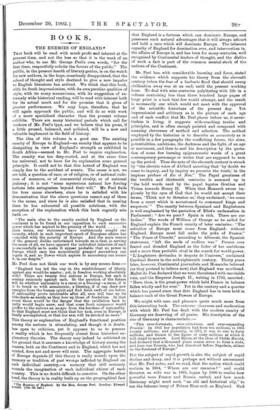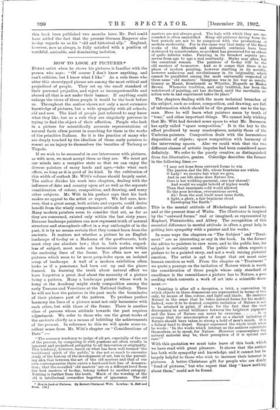BOOKS.
THE ENEMIES OF ENGLAND.*
Tins book will be read with much profit and interest at the present time, and not the less so that it is the work of an
author who, to use Mr. George Peel's own words, "for the first time, respectfully solicits the favour of the public." The public, in the present dearth of literary genius, is on the watch for new authors, in the hope, ceaselessly disappointed, that the school of thought and style destined to give a new impulse to English literature has arrived. We think that this book, with its fresh impressionism, with its own peculiar qualities of style, with its many mannerisms, with its suggestion of ex- tremely wide historical reading, will be read with interest both for its actual merit and for the promise that it gives of greater performance. We may hope, therefore, that he will again approach the public, and will do so with work of a more specialised character than the present volume exhibits. There are many historical periods which call for workers of Mr. Peel's type, and we believe that his prose, if a little pruned, balanced, and polished, will be a new and valuable implement in the field of history.
The idea of this volume is a good one. The existing enmity of Europe to England—an enmity that appears to be dissipating in view of England's strength as exhibited in South Africa—seemed to Mr. Peel to require explanation.
The enmity was too deep-rooted, and at the same time too universal, not to have for its explanation some general principle. It could not be that this hatred of England was simply due to the accident of events. The cause is not, we are told, a question of race, or of religion, or of national rude- ness of manners, or of commercial rivalry, or of national jealousy ; it is not " some mysterious natural law forcing nations into antagonism beyond their will." Mr. Peel finds the true cause elsewhere, since he is satisfied with his demonstration that the above questions cannot any of them be the cause, and since he is also satisfied that in naming them he has exhausted all possible solutions, with the exception of the explanation which this book cogently sets forth :—
" The main clue to the enmity excited by England on the continent is to be found in our opposition to each successive power which has aspired to the primacy of the world. In plain terms, our statesmen have continuously sought our security, which in each important epoch of European affairs has coincided with the security of Europe. And the main reason of the general dislike entertained towards us is that, in serving the cause of all, we have opposed. the individual interests of each so successfully as to make it appear probable that no power in Europe which once has momentarily grasped ascendency can regain it, and no Power which aspires to ascendency can secure it, in our despite."
Mr. Peel does not think our work is by any means done :- "England has led the way in the establishment of liberty against any would-be master; yet, is freedom working absolutely well? There are twenty free nations in Europe, but each is arming ruinously against each. So the question of the future will be whether nationality is a curse or a blessing—a curse, if it is to break us with armaments; a blessing, if it can draw new energies from the human spirit and find fresh reefs of ore below. If nationality prove intolerable after all, men will tear up its title-deeds as surely as they tore up those of feudalism. In that event there would be the danger that the oscillation back to unity would begin anew, and that some fresh conqueror would proffer to the nations an escape from the burdens of nationality. So that England must not think that her task, even in Europe, is finally accomplished, or that her arm will be invoked no more."
This theory or explanation of England's functional position among the nations is stimulating, and though it is doubt-
less open to criticism, yet it appears to us to possess a reality which is too frequently absent from historical ex- planatory theories. The theory may indeed be criticised on the ground that it assumes a knowledge of history among the masses, both on the Continent and in England, which has not existed, does not and never will exist. The aggregate hatred of Europe depends (if this theory is really sound) upon the memory or tradition of past wrongs inflicted by England on each individual country,—a memory that still seriously wounds the imagination of each individual citizen of each country. This is no doubt difficult to conceive. On the other hand, the theory is in reality built up on the geographical fact
• The Enemies of England. By the Hon. George Peet London: Edward Arnold. [12e. 6d. net.1
that England is a fortress which can dominate Europe, and possesses such natural advantages that it will always attract and hold a race which will dominate Europe. The inherent capacity of England for domination over, and intervention in, the affairs of Europe is, and has been for many centuries, well recognised by Continental leaders of thought, and the dislike
of such a fact is part of the common mental stock of the nations of the Continent.
Mr. Peel has, with considerable learning and force, stated
the evidence which supports his theory from the eleventh century (when the fear of a barbaric flood that should sweep civilisation away was at an end) until the present working
hour. To deal with nine centuries palpitating with life in a volume containing less than three hundred large pages of
large print is a task that few would attempt, and the result is necessarily one which would not meet with the approval of the scientific historians of the present day. Yet impressionist and arbitrary as is the picture of each age and of each conflict that Mr. Peel places before us, it never- theless is living, it suggests wide-reaching truths and principles, and is often enough painted and composed with amazing cleverness of method and selection. The method employed by the historian is to describe as accurately as is possible in a few paragraphs the conflicting forces, the aims, potentialities, ambitions, the darkness and the light, of an age or movement, and then to seal his description by the quota- tion of some few burning epigrammatic words of a great contemporary personage or writer that are supposed to sum up the period. Thus the note of the eleventh century is struck
by " the electric voice of Abelard asserting that by doubt we come to inquiry, and by inquiry we perceive the truth,' in the impious preface of Sic et Non." The Papal greatness of the twelfth and thirteenth centuries is summed up in
" the bold words used by the papal legates Gratian and Vivian towards Henry II. When that Monarch swore im- piously by the eyes of God that he would not accept their terms, Think not to threaten us,' they exclaimed ; ' we come from a court which is accustomed to command kings and emperors." The enmity between Spaniard and Englishmen
is well emphasised by the quotation of Eliot's exclamation in Parliament : " Are we poor P Spain is rich. There are our Indies." The words of William of Orange as he sailed for
England explain the French enmity of later centuries : " The salvation of Europe must come from England : without England, Europe must fall under the yoke of France." " The Peace of Utrecht," according to Alberoni, the Spanish
statesman, " left the seeds of endless war." France ever feared and dreaded England as the foiler of her ambitions and a more than probable rival in the search for world-power.
"L'Angleterre deviendra le despote de l'univers," exclaimed Cardinal Bernis in the mid-eighteenth century. Thirty years later, however, Continental journalists and Monarchs believed (as they pretend to believe now) that England was moribund.
Mallet du Pan declared that we were threatened with inevitable ruin, and the Emperor Joseph II., writing in 1783, asserted : " Here, then, is the great power which held France in balance fallen wholly and for ever." Yet in the century and a quarter which has passed since that date England has in turn held in balance each of the Great Powers of Europe.
We might with ease and pleasure quote much more from this interesting book. The extreme clearness and moderation with which Mr. Peel has dealt with the modern enmity of Germany are deserving of all praise. His description of the rise of Germany is characteristic :— " This ever-fortunate, ever-victorious, and ever-expanding Prussia! In 1815 her population had been ten millions, in 1885 twenty millions; and presently, in 1871, it was to rise to forty millions, and thence to the figure of sixty millions at which it will stand to-morrow. Lord Byron, at the close of Chi/c14 Harold, had declared that a thousand years scarce serve to form a state, and here was Prussia, who had dissolved before Napoleon, ablaze on the forehead of Europe."
But the subject of rapid growth is also the subject of rapid decline and decay, and it is perhaps not without amusement that Mr. Peel notes, and we read, that the nation which could exclaim in 1884, " Where are our enemies ?" and could
threaten us with war in 1885, began by 1886 to realise how powerful were France and Russia united, and how much Germany might need such "an old and historical ally," to use the fulsome irony of Prince Bismarck, as England. Had this book been published two months later, Mr. Peel could have added the fact that the present German Emperor also to-day regards us as his " old and historical ally." England, however, now as always, is fully satisfied with a position of watchful, amicable, and dominating isolation.











































 Previous page
Previous page